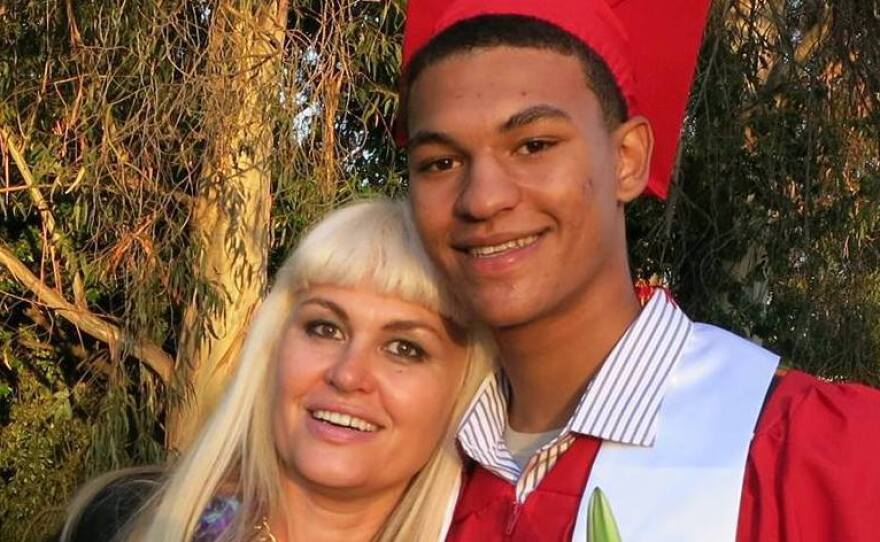
Rachel Swinehart has commandeered her family's living room in Cedar Rapids, Iowa. It's filled with large plastic tubs containing stuff like pink bedding and a coffee maker.
Rachel, 18 is about to head off to Shenandoah College, a small arts school in Virginia, where she'll study harp performance. In many ways, organizing her stuff is the easy part. Talking about the risks of college life — that's a bit harder.
In recent months, colleges across the country have been facing increased scrutiny over their handling of safety issues such as sexual assault. And statistically speaking, freshmen and sophomores are particularly at risk to become victims.
Rachel's mother, Robyn Swinehart, has spoken with her daughter about some things. "Yes, you're of legal age. Yes, you're a big girl now," Robyn says. "But you still have to be aware of when bad things can occur and be conscious of what could happen."
"One thing stuck with me from both my parents, it's like — you can't really trust anyone fully," Rachel said. "So just be careful of who you know and who you make friends with."
Rachel and Robyn have talked about peer pressure and sex, but they haven't talked explicitly about sexual assault.
Neither has the Reilly family.
In Berkeley, Calif., Erin Reilly is getting ready for her freshman year at Kalamazoo College in Michigan. Her parents, Gail and Dennis, have talked to her about partying. "Be careful about drinking," they say. "Don't get a drink from someone else."
But Erin, 19, is shy. So while her parents want their daughter to be aware of sexual assault, they don't want to scare her away from making new friends, including boys.
"I tell her that there are nice guys in this world," says Dennis, "and usually they're the ones that don't have a date."
As far as talking about sexual assault, though, Erin says her parents have barely grazed it.
"That's one thing I might be relying more on the college orientation helping them through, and giving them some guidelines and things to look out for," says Gail.
Just a few miles away in Oakland, Oneida Cordova has been talking openly about sexual assault with her daughter, Onaja Waki, for years. Onaja is heading up north to Humboldt State University.
"I've been getting advice from my parents, my aunt, friends — making sure I stay safe," Onaja says.
Oneida tells her daughter that if she sees something going on, she is supposed to report it. "Or you are just as guilty as the person who has done it," she says. "And If I find out you're not doing that, I'm [going to] hold you responsible."
And if Onaja herself is assaulted, Oneida says the rule is to call her first.
"You must warn boys, 'I did not come here to be assaulted and attacked and violated,' " she says.
It already seems hard to imagine your kid being violated, and very few parents I talked to had investigated their child's school's policy on handling sexual assault. Talking with their kids about not becoming a perpetrator seems even harder — but some families are having that conversation.
"I'll always try to keep a clear head, make the right decisions and not be afraid to help someone around me, whether or not it has anything to do with me," says Rae Dallett, 17. About to be a freshman at the University of California, Los Angeles, he's reassuring his mother he'll do the right thing.
His mother, Cassandra, tells Rae that it's no excuse if a girl is drunk and it doesn't matter how she's behaving. And he may hear all kinds of justifications while at school, she tells him. "I think what concerns me the most is not falling into that group mentality," she says, "Like, 'Oh, she's a slut,' or, 'She came wearing a short skirt,' or, '[She] already had sex with one of the guys, therefore it's OK if everybody does.'
"None of that is OK and acceptable," Cassandra tells her son. "You have to treat every single woman that you encounter like that's your mom, your sister."
"You don't have to worry about me not trying my best to keep other people out of that situation — and keeping myself out of any kind of situation like that," Rae says.
I'm also heading to college, at The New School in New York City, all the way across the country from my home in Oakland, and all these conversations had me thinking about my own family.
We've always talked openly about sex and consent. One time, when my brother was younger, he even asked our mom, "How you know when it's OK to kiss somebody?"
Her solution: Ask.
"It's really easy: 'Can I kiss you?' " she said. "It can be really sexy and hot. It doesn't have to be weird. You can put it into your game."
And even though I'm gay and my twin brother is straight, she tells us the same thing: If you cannot talk about sex, you should not have it.
"If you can't have a conversation with someone that you're about to have sex with, that is an indication that you should not be intimate physically," she says.
Got it, Mom.
It's awkward talking about sex with your parents — and sexual assault is way more complicated. But with awareness of the issue increasing, these conversations may soon show up on more parents' checklists as they get their kids ready for school.
This story was produced by Youth Radio.
Copyright 2014 Youth Radio. To see more, visit http://www.youthradio.org/.






